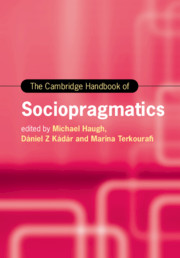Book contents
- The Cambridge Handbook of Sociopragmatics
- Cambridge Handbooks in Language and Linguistics
- The Cambridge Handbook of Sociopragmatics
- Copyright page
- Contents
- Figures
- Tables
- Contributors
- Acknowledgements
- 1 Introduction
- Part I Fundamentals of Sociopragmatics
- Part II Topics and Settings in Sociopragmatics
- 13 Face, Facework and Face-Threatening Acts
- 14 Relationships and Relating
- 15 Analysing Identity
- 16 (Im)politeness and Sociopragmatics
- 17 Affect and Emotion
- 18 Power
- 19 Morality in Sociopragmatics
- 20 Conversational Humour
- 21 Gesture and Prosody in Multimodal Communication
- 22 Digitally Mediated Communication
- 23 Workplace and Institutional Discourse
- 24 Service Encounter Discourse
- 25 Argumentative, Political and Legal Discourse
- 26 The Pragmatics of Translation
- Part III Approaches and Methods in Sociopragmatics
- Index
- References
25 - Argumentative, Political and Legal Discourse
from Part II - Topics and Settings in Sociopragmatics
Published online by Cambridge University Press: 01 April 2021
- The Cambridge Handbook of Sociopragmatics
- Cambridge Handbooks in Language and Linguistics
- The Cambridge Handbook of Sociopragmatics
- Copyright page
- Contents
- Figures
- Tables
- Contributors
- Acknowledgements
- 1 Introduction
- Part I Fundamentals of Sociopragmatics
- Part II Topics and Settings in Sociopragmatics
- 13 Face, Facework and Face-Threatening Acts
- 14 Relationships and Relating
- 15 Analysing Identity
- 16 (Im)politeness and Sociopragmatics
- 17 Affect and Emotion
- 18 Power
- 19 Morality in Sociopragmatics
- 20 Conversational Humour
- 21 Gesture and Prosody in Multimodal Communication
- 22 Digitally Mediated Communication
- 23 Workplace and Institutional Discourse
- 24 Service Encounter Discourse
- 25 Argumentative, Political and Legal Discourse
- 26 The Pragmatics of Translation
- Part III Approaches and Methods in Sociopragmatics
- Index
- References
Summary
This chapter examines the contextual constraints and requirements of argumentative, political and legal discourse, focusing on their bridging points as well as on where they depart. While political discourse and legal discourse are representatives of public discourse and institutional discourse with political discourse also constituting media discourse, argumentative discourse can be found across various discourse domains ranging from political and legal discourse to mundane, everyday talk. The first part provides an analysis of the pragmatics of argumentative discourse, concentrating on the communicative function of argumentative strategies and their generalized and particularized realizations across different discourse domains. The second part examines political discourse as communicative action considering the multilayeredness of production and reception formats, and the third part gives an analysis of legal discourse. In the final part the strategic use of argumentative strategies is discussed in the context of political and legal discourse.
- Type
- Chapter
- Information
- The Cambridge Handbook of Sociopragmatics , pp. 520 - 543Publisher: Cambridge University PressPrint publication year: 2021
References
- 5
- Cited by



